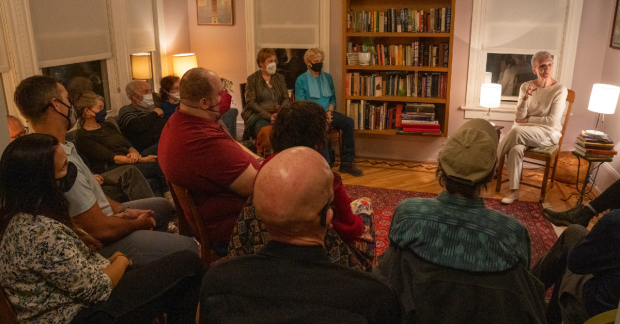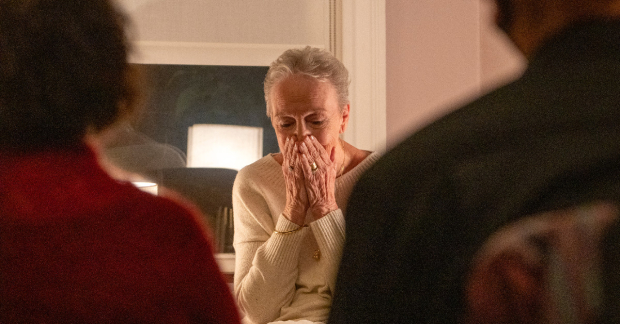Review: Emotion Is Kept at a Sensible Distance in Joan Didion's The Year of Magical Thinking
Kathleen Chalfant stars in Didion’s play of mourning in a new Keen Company production.

(© Richard Termine)
"She's a pretty cool customer." That's how a hospital social worker described Joan Didion after her husband, author John Gregory Dunne, died suddenly at their dinner table just hours before. It's a phrase that stuck with me during Kathleen Chalfant's nuanced performance in The Year of Magical Thinking, Didion's theatrical adaptation of her acclaimed memoir about grief. The description hit me as instructive of the different ways people mourn the loss of a loved one: some scream and shake their fists at the sky, others try to keep order and rein in emotions even as their life implodes.
The play had modest success on Broadway in 2007, with Venessa Redgrave playing Didion in a Tony-nominated solo performance. Keen Company has now creatively revived and staged the work in venues much more intimate than the Booth Theatre: Audiences see the play either in a group of about a dozen in the living room of an apartment, or in slightly larger numbers at various community spaces. The venues are located throughout four of the city's five boroughs (not in Staten Island). Presenting the play this way, director Jonathan Silverstein lends familiarity and depth to a monologue that can at times feel austere.
The Upper East Side apartment where I watched might be described that way, with its trendy blend of modern and antique decor, impeccably polished surfaces, and bright overhead lighting (by Anshuman Bhatia) that chased every shadow from the room. Chalfant — elegant and distinguished in an ecru sweater and pants (costume design by Jennifer Paar) — entered carrying a copy of Didion's book in hand and wearing a necklace with two rings (in her memoir, Didion mentions a similar necklace, from which hang her wedding ring and a baby ring given to her daughter, Quintana). She sat in a red-upholstered chair with 12 or so spectators watching from couches and assorted seating. The gathering had the feel less of a theatrical event than of a semiformal get-together where we had assembled to hear a friend tell us something important.
"This happened on December 30, 2003. That may seem like a while ago but it won't when it happens to you. And it will happen to you." There's an off-putting presumptuousness in Didion's initial words. How can someone from a rarified demographic — white, monied, famous — presume to know what will happen to other people? Of course, what we're about to hear in the next 90 minutes won't happen to us in the details. Didion's story revolves around the specifics concerning the death of her husband and the mysterious, life-threatening illness that soon after put Quintana into a coma, and eventually took her life.

(© Richard Termine)
What she does seem to mean by the it that will happen to us is the collapse of logical thought that follows the death of a person whose life is intricately interwoven with our own. Their passing, she implies, will leave us wondering what we could have done differently — maybe what we can still do differently — to make the person stay. The confused belief that we can change the past by performing a ritual or by saying the right words defines the magical thinking of the title. It explains why, following Dunne's death, Didion is unable to give away his shoes. What will he have to wear when he comes home?
Such memories are what make The Year of Magical Thinking a powerful play about the grieving process, but I couldn't help feeling something was missing. We never hear Didion mention that she cried or lost control of her emotions; her grief seems too structured for that. Instead, she attempts to make sense of what is happening by reconstructing chronologies of the events after John's death, and listing the medications Quintana takes, with the dogged persistence of a journalist, which she was. Though the piles of details were a part of the way she tried to control the uncontrollable, to an audience they often seem less important. It's at those moments that the play reads like someone else's grocery list.
But Chalfant injects unexpected emotion into other scenes. At Dunne's funeral, Didion muses, "I had played along, I had followed the ritual, I had made the arrangements. I had acknowledged that he was dead. I had done this in as public a way as I could conceive. Why didn't he come back?" The irrational question rushes from Chalfant in a sudden wave of anguish as though it might turn into a howl of rage, and we feel our own throats tighten. It's the emotion (and the theater) we knew was hidden beneath all the details and all that measured self-control.
The timing of this production feels appropriate. Didion's death last year (almost 18 years to the day after her husband's) makes now a suitable time to revisit the work; and since 2020 the world has been dealt catastrophic blows of death and grief with which we are still grappling. People mourn in their own ways. The Year of Magical Thinking will be a balm for some, a quieter way to meditate on the inevitable. Others may find more satisfaction in a scream.









